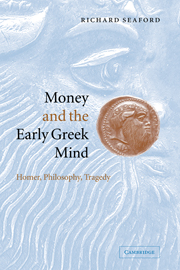Preface
Published online by Cambridge University Press: 22 September 2009
Summary
This book argues that the monetisation of the Greek polis in the sixth and fifth centuries bc contributed to a radical transformation in thought that is, in a sense, still with us. Academics – perhaps because they are more interested in texts than in money – have emphasised rather the role of alphabetic literacy in the radical intellectual changes of this period. They are often also emotionally invested in the autonomy of their various specialisms, an investment encouraged by the institutional division of academic labour. For most presocratic scholars, to allow that any kind of social process might illuminate their texts would threaten their control of their subject and the autonomy of ‘doing philosophy’. The consequent subconscious policing of the boundaries can be simultaneously sincere and brutal. For embarking on such a fundamental question I make no apology, and hope that others will be inspired to remedy the inadequacies of my answers.
I thank all those who have over many years, in formal and informal settings, discussed with me a theme – the western genesis of money and its consequences – that seems to be of interest to everybody. Further, the book has benefited from the reading of chapters 2–8 by Jack Kroll, 2–7 by Henry Kim, 4d–5a by Robert Parker, 6 by Peter Haarer, 9 and 10 by Geoffrey Lloyd, 9–13 by Malcolm Schofield, 13b by Carl Huffman, 13c by Paul Woodruff, and the whole book by Christopher Gill and by Robin Osborne.
- Type
- Chapter
- Information
- Money and the Early Greek MindHomer, Philosophy, Tragedy, pp. xiPublisher: Cambridge University PressPrint publication year: 2004



